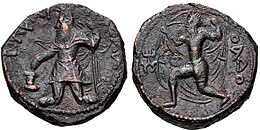| This article includes a list of references, related reading, or external links, but its sources remain unclear because it lacks inline citations. Please help improve this article by introducing more precise citations. (November 2019) (Learn how and when to remove this message) |

| Part of a series on |
| Zoroastrianism |
|---|
 |
| Primary topics |
| Divine entities |
| Scripture and worship |
| Accounts and legends |
|
History and culture
|
| Adherents |
| Related topics |
|
|
Vāyu-Vāta or Vāta-Vāyu (IPA: ʋɑːyu-ʋɑːt̪ə) is the Avestan language name of a dual-natured Zoroastrian divinity of the wind (Vayu) and of the atmosphere (Vata). The names are also used independently of one another, with 'Vayu' occurring more frequently than 'Vata', but even when used independently still representing the other aspect.
The entity is simultaneously benevolent and malevolent, that is, depending on the circumstances, either yazata - "worthy of worship" - or daeva, which in the Gathas is a "god that is (to be) rejected". Scripture frequently applies the epithet "good" when speaking of one or the other in a positive context.
In Zurvanism (Zurvanite Zoroastrianism, a now-extinct form of Zoroastrianism), Vata-Vayu represented two facets of the quaternary Zurvan. In this arrangement, Vata-Vayu represented "space" while the other two facets represent "time."
Vayu-Vata has Indo-Iranian roots, and has the same name in historical Vedic religion.
In Sanskrit and Hinduism
Both the words Vāta and Vāyu have almost identical meanings in Sanskrit or Vedic traditions. Although there is no god representing Vata, there is the god Vayu representing air. The word Vata is still used today in many Indian languages to denote atmosphere. Atmosphere in Hindi, Marathi etc., is called Vatavaran (वातावरण). which is made of two words Vata meaning Air, Avaran (आवरण) meaning layer.
References
- Dhalla, M. N. (1938), History of Zoroastrianism, Oxford: OUP, pp. 160, 219–221, 274–275
| Zoroastrian-Iranian calendar | |
|---|---|
| Days | |
| Months | |
| Festivals | |
| Jashe/Parab days | |
This Zoroastrianism-related article is a stub. You can help Misplaced Pages by expanding it. |
- ^ Foundation, Encyclopaedia Iranica. "Welcome to Encyclopaedia Iranica". iranicaonline.org. Retrieved 2024-07-24.
- ^ Joshi, J. R. (1973). "Vāta-Vāyu". Bulletin of the Deccan College Post-Graduate and Research Institute. 33 (1/4): 227–248. ISSN 0045-9801. JSTOR 42936419.